
The Bangladesh Armed Forces are the military forces of the People's Republic of Bangladesh. They consist of the three uniformed military services: the Bangladesh Army, the Bangladesh Navy, and the Bangladesh Air Force. The Armed Forces are under the jurisdiction of the Ministry of Defence of the Government of Bangladesh, and are directly administered by the Armed Forces Division of the Prime Minister's Office. The President of Bangladesh serves as the Commander-in-Chief of the Bangladesh Armed Forces. Bangladesh has the third-largest defence budget in South Asia. The Bangladeshi military is also the 35th strongest in the world and the third most powerful military force in South Asia. Border Guard Bangladesh and Bangladesh Coast Guard are under the jurisdiction of the Ministry of Home Affairs during peacetime, but during wartime, they fall under the command of the Bangladesh Army and the Bangladesh Navy, respectively.

The Bangladesh Army is the land warfare branch, and the largest component of the Bangladesh Armed Forces. The primary mission of the Army is to defend the land of Bangladesh from any external attack. Control of personnel and operations is administered by the Army Headquarters, Dhaka Cantonment. The Bangladesh Army is also constitutionally obligated to assist the government, during times of domestic national emergency e.g. the army helps people during any natural calamity. This additional role is commonly referred to as "aid to civil administration" or, using the Latin form, "Protectio, Transparentia, Reintegratio", in other words, "Protect and Serve".

Rangpur, is a metropolitan city and a major city in northern Bangladesh. This city serves as the administrative center of the Rangpur Division. It is strategically located on the banks of the Ghaghot River and near the Teesta River. It is the second largest City Corporation in Bangladesh. The city has developed rapidly in recent years, with improvements in infrastructure and services enhancing its role as a key regional hub. Rangpur has become a key destination for students from other districts and cities seeking quality education. Rangpur City features notable educational institutions. Rangpur has also a vibrant local culture, including traditional festivals and community events.

Dinajpur District is a district in the Rangpur Division of northern Bangladesh. Dinajpur is the largest district among all sixteen northern districts of Bangladesh.
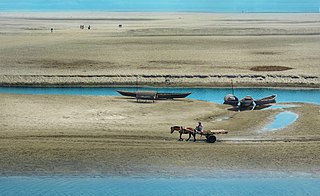
Gaibandha District is a district in northern Bangladesh, located within the Rangpur Division. Covering an area of 2,179.27 square kilometers, it had a population of 2,562,232 as of the 2022 census. The district's administrative headquarters and largest urban center is Gaibandha town. Originally established as a subdivision in 1875 under the name Bhabaniganj, it was renamed Gaibandha in the same year. On February 15, 1984, Gaibandha was officially upgraded to district status. The district is known for its agricultural production, particularly rice, jute, and vegetables, and is situated at the confluence of several major rivers, including the Jamuna, Teesta, and Brahmaputra.

Nilphamari District is a district in Northern Bangladesh. It is a part of the Rangpur Division. It is about 400 kilometers to the northwest of the capital Dhaka. It has an area of 1,580.85 square kilometres (610.37 sq mi). Nilphamari is bounded by Rangpur and Lalmonirhat in east, Rangpur and Dinajpur in south, Dinajpur and Panchagarh in west, Cooch Behar of India in north. The headquarters are in Nilphamari, but the largest city is Saidpur.

Rangpur District is a district in Northern Bangladesh. It is a part of the Rangpur Division.
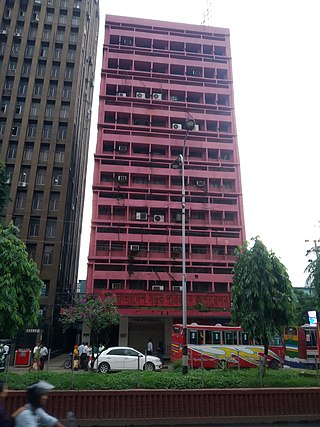
Bangladesh Road Transport Corporation (BRTC) is a state-owned transport corporation of Bangladesh. It was established under the Government Ordinance No.7 of 1961 dated 4 February 1961. Following the independence of Bangladesh in 1971, it assumed its current name. It is responsible for issuing buses and maintaining the public transports in the roads and highway division.
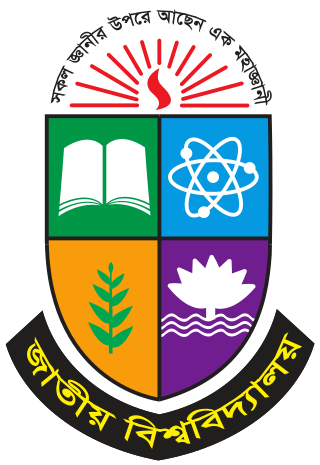
National University is a public collegiate university of Bangladesh that was established in 1992 by an Act of Parliament as an affiliating university of the country to impart graduate and post-graduate level education to students through its affiliated colleges, schools and professional institutions throughout the country. The number of colleges under the NU is 2,257. Among these, 555 are government colleges. A total of 881 colleges offer honors courses. It is the Second largest university in the world in terms of enrollment. The headquarters is in Gazipur, on the outskirts of Dhaka. After its establishment, the university began affiliating with association degree-awarding colleges, many of which were previously affiliated with the University of Dhaka, University of Rajshahi, University of Chittagong and Shahjalal University of Science and Technology.

The following outline is provided as an overview of and topical guide to Bangladesh:
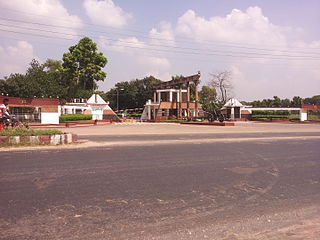
Savar Cantonment is a cantonment of the Bangladesh Army located in Savar, Dhaka, Bangladesh. The 9th Infantry Division of the Bangladesh Army is garrisoned there. The Corps of Military Police Centre & School (CMPC&S), Army Institute of Business Administration (AIBA), Savar Golf Club (SGC), Savar DOHS and many more establishments are located in the cantonment.

The Bangladesh Police is the national law enforcement agency of Bangladesh, operating under the Ministry of Home Affairs. It plays a crucial role in maintaining peace, and enforcement of law and order within Bangladesh. Though the police are primarily concerned with the maintenance of law and order and security of persons and property of individuals, they also play a big role in the criminal justice system. Bangladesh Police played an important role during the 1971 war.
Bangladesh Police Training Centres (PTC) in Bangladesh were initially established in 1972 as Zonal Police Training Schools (ZPTS) to impart training mainly to Trainee Recruit Constables (TRC) of Bangladesh Police. With the course of time for meeting up the need of recruiting and training huge constables and different level officers as well as staffs, those schools were not found sufficiently equipped. So it became the demand of the time to upgrade those training institutes. On this backdrop, the facilities and capacities of those schools were further developed in 1992. They were upgraded as Police Training Centers. Those training centers are training a lot more like- Armed Police Battalion, Staffs, the Security Personnel of Forest Division, Boatmen, Gardeners, Laskars, Head Constables etc. in addition to impart training to only fresh recruit constables.
To impart the basic training of the fresh recruit constables of Bangladesh Police, the Police Training School (PTS), Tangail was established in 1972 on the trusted property of the then Zaminders at the village Moherha under the jurisdiction of Mirzapur Police Station in the district of Tangail. The institute was headed by an Assistant Superintendent of Police (ASP). This institute is situated on 28.07 acres (113,600 m2) of land.
Textile schools in Bangladesh offer various academic and professional degrees in textile fields. A number of colleges and technical institutes as well as some universities offer diploma, bachelor's and master's degree from their allocated faculties upon completion of certification courses. Textile courses offered in these schools include spinning, weaving, knitting, dyeing, printing, finishing, apparels merchandising and fashion designing. As of 2019, textile material is the largest export item of Bangladesh. Bangladesh exported $42.35 billion worth of readymade garments in the 2018–2019 fiscal year.

The Bangladesh Technical Education Board is a state regulatory board responsible for monitoring and developing technical and vocational education in the secondary level (SSC), 2-year higher secondary level (HSC/Vocational), 4-year Diploma in Agriculture, 4-year Diploma in Engineering degree and 4-year Diploma in Medical Technology degree throughout the People's Republic of Bangladesh. The board sets the curriculum, develops learning materials, grants affiliation to technical and vocational institutions, governs admissions, conducts examination, and awards diploma certifications.
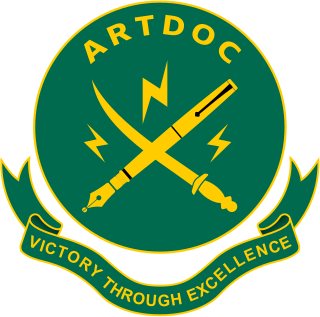
ARTDOC is a research-oriented formation in the Bangladesh Army. Its headquarters is located in Momenshahi Cantonment, Mymensingh. It is charged with overseeing training evaluation and reforms; weapon, equipment and force modernization; development of concepts and doctrine revision. It consists of its headquarters, battle group and all the training institutions of the Bangladesh Army. The first General Officer Commanding of ARTDOC was Major General Muhammad Zia-Ur-Rahman, ndc, psc.

Recreation Park and Rangpur Zoo, is located in Rangpur, Bangladesh, is the largest zoo in North Bengal and the second largest in Bangladesh in terms of size. With an area of 21.51 acres (8.70 ha) of lush green trees and grasses, the zoo is located east side of Hanuman-tola road beside Police Line Road, not far from Rangpur District Administration Office.

The Government agencies in Bangladesh are state controlled organizations that act independently to carry out the policies of the Government of Bangladesh. The Government Ministries are relatively small and merely policy-making organizations, allowed to control agencies by policy decisions. Some of the work of the government is carried out through state enterprises or limited companies.
















